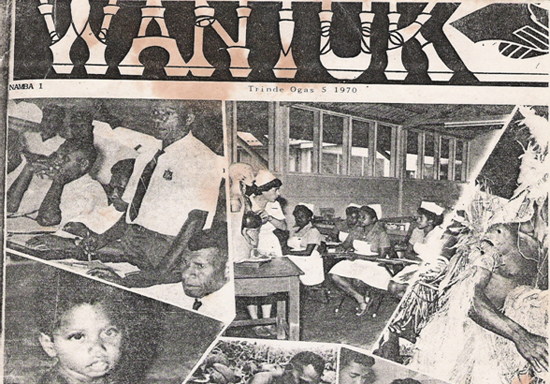
This doctoral thesis builds on the author’s MA thesis, "The Apostolate of the press: Missionary language policy, translation and publication in German New Guinea," (CQU 1997) which concluded by arguing that the decision by the Divine Word mission to adopt Tok Pisin as a Tok Lotu was a significant factor in the growth and importance of Tok Pisin in New Guinea.
This argument has been amplified elsewhere by the author in conference papers and publications ("Yu mas kamap wan nesen: The role of mainstream churches in promoting Tok Pisin literacy in Papua New Guinea," in Paideuma, Frobenius Institute/Goethe University, No. 46, 2001 and "Lotu or nation? Tok Pisin and Tok Ples as languages of identification in Papua New Guinea," in Media Development, World Association for Christian Communication, 2000).
"People, politics and press" draws together a number of other strands of the author’s research in which he has claimed the emergence of a unique form of Pacific journalism in the post-independence period. Described by the author as a second wave of development journalism, this model combines aspects of development communications with Western notions of the press as watchdog. This model has been further enhanced, especially in Papua New Guinea, by the role of the mainstream churches in the media. In PNG, the impact of the Second Vatican Council’s commitment to social communication has been particularly evident in Wantok niuspepa, which was started under the auspices of the Divine Word mission by Fr Frank Mihalic.
The thesis traces the development of the press in PNG after the Second World War in a series of snapshots that focus on how particular newspapers reported on significant issues of the day. The thesis begins with the short-lived Rabaul Times, moves on to the then new Post-Courier and then looks at the emergence of Wantok. In each case the discussion of the newspapers is placed against a historical background that shows how the growth of the post-war newspaper industry reflected dramatic changes in attitudes and expectations of the PNG’s population. The thesis shows how the press gradually changed from being, in Hank Nelson’s words, a mirror of the expatriate population to being a mirror of the indigenous people’s hopes for the future as independence approached.
The thesis touches on a number of important events, including the Navanuram shootings, the first landowner protests against the Bougainville mine, the emergence of Tok Pisin as a national lingua franche and the rise of PNG’s indigenous political class, led by Sir John Guise and Sir Michael Somare. Because the newspapers did – and continue to – reflect the lives of the people of PNG, the thesis also looks at a range of other issues, from the place of women in pre-independence PNG to cargo cults, sex, murder and shopping.
The thesis concludes by examining the role of the media in PNG today and compares what happened in the former Australian administered territory with what role the press played in the Solomons, Vanuatu and Fiji.
Cass, Philip (2008). People, politics and press in Papua New Guinea 1950-1975. Unpublished PhD thesis. Rockhampton: Central Queensland University. Held at CQU library: http://tinyurl.com/499gvut


